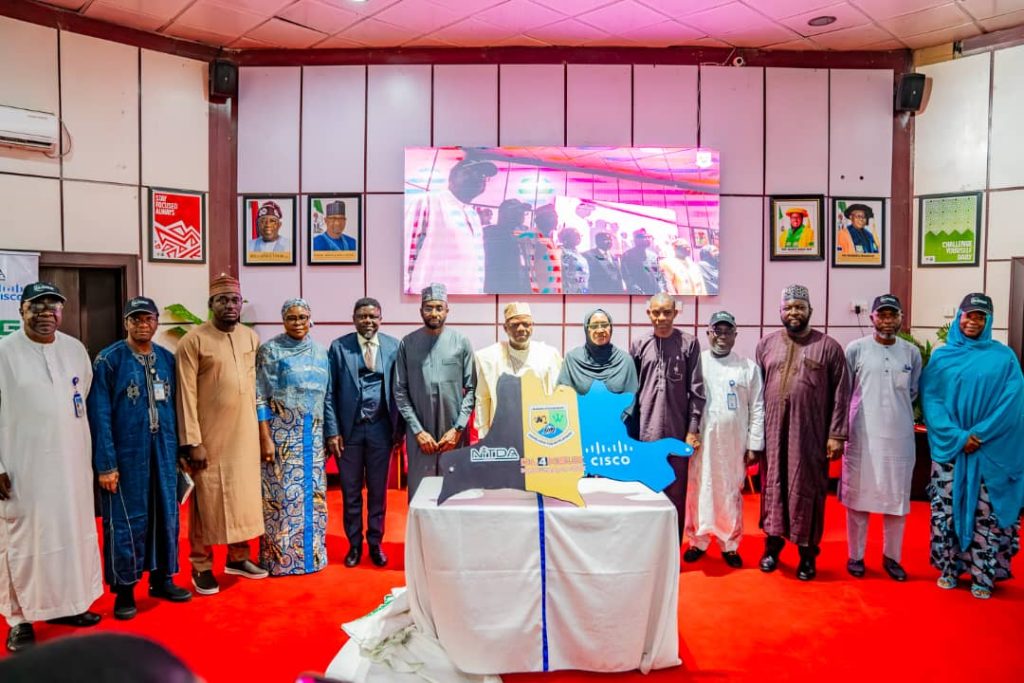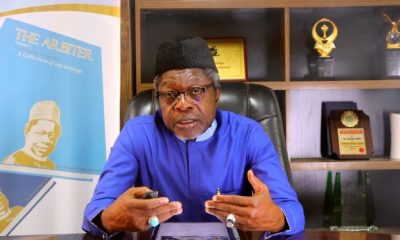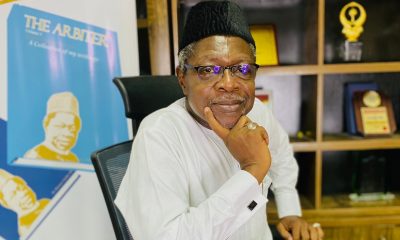News
NDLF: NITDA, CISCO, LAUNCH DIGITAL LITERACY TO PRODUCE MARKETABLE GRADUATES
AJAGBE ADEYEMI TESLIM
SPONSORED BY: H&H
As part of its continued efforts at reforming the economy for sustained inclusive economic growth and actualising the presidential target of equipping 70% of Nigerian citizens with digital literacy and skills by the year 2027, the National Information Technology Development Agency (NITDA), through its National Digital Literacy Framework (NDLF), has launched the Digital Literacy For All Initiative(DL4ALL) at the Nassarawa State University, Keffi towards incorporating digital literacy into the institution’s curriculum.

DG NITDA, Kashifu Inuwa, Prof. Saadatu Liman, VC, NSUK alongside dignitaries, members of management staff of NITDA and NSUK, officially flagging off the DL4ALL initiative at the Nassarawa State University Keffi, Nassarawa State.
This initiative, launched in collaboration with CISCO and Nasarawa State University Keffi (NSUK), aims to ensure that students at every educational level achieve digital literacy before graduation and to support the presidential target of 70% digital literacy amongst its citizenry by 2027.
Giving his special address at the launching ceremony, the Director General of NITDA, Kashifu Inuwa CCIE, expressed his excitement at the remarkable milestone achievement, that the ecosystem collaboratively made in ensuring inclusive access to digital literacy for all.
“It is a pivotal moment for our relationship of building the ecosystem in terms of bringing the industry, the academia and the government to work together,” he noted.He stated that with Cisco’s support and government-backed frameworks, digitally proficient graduates who will plug seamlessly into the workforce would be produced rather than mere degree holders.Citing projections from the World Economic Forum which estimates a global talent shortage of 85 million people by 2030, potentially resulting in 8.5 trillion dollars in unrealised annual revenue, Inuwa averred that Africa and Nigeria in particular, have a tremendous opportunity to fill the gap.
While emphasising the President’s directive of driving economic transformation through technology and skills development, Inuwa stated that it was essential to build a digitally skilled workforce that would accelerate the country’s economic growth and development.
“In a world we live in today where digital is a lifestyle, digital literacy is no longer optional, but it is a necessity because we need it to be included in everything we do. Today, to be digitally included economically, and financially, you need to be digitally literate, so you need to have the fluency to navigate the digital world,” he mentioned.
Speaking on the NDLF that was developed which birthed the DL4ALL initiative, the NITDA DG mentioned that the initiative would help build a digitally savvy population that cuts across all sectors because Information Technology is pervasive.
Enumerating the core competencies of the framework which are; device and software operation, information and data literacy, collaboration and communication, digital content creation, safety, and lastly, problem management, Inuwa asserted that the competencies will allow students to safely and effectively use technology in creating content, managing data, solving problems and collaborations with students in other universities.
He explained that the launch of the DL4ALL at NSUK aligns with Nigeria’s mission of achieving digital sovereignty and would empower students not just to secure jobs but to create them, particularly through entrepreneurship programs that encourage students to start businesses before graduation.
While urging the students to embrace technology as a limitless platform that will inspire them to be innovative and fearless, Inuwa said “I believe with technology, your limitation is your imagination because with the ubiquitous data we have today, unlimited connective and massive processing power, you all can achieve whatsoever you imagine.
”Earlier in her welcome address, the NSUK Vice Chancellor, Prof Sadaatu Hassan Liman described the partnership between the university and NITDA as a transformative one that will allow students at the university to leverage the DL4ALL programme in acquiring digital skills that will enable them to thrive in the 21st-century global landscape.
She noted that the programme is not only empowering the students but positioning the university as a regional leader in Information and Communications Technology and emerging technologies.
“This strategic integration of cutting edge technologies into our academic offerings will open up a lot of opportunities to our students and staff as well, allowing them to develop critical thinking, problem-solving and innovative mindsets required to navigate the rapidly evolving digital world,” she said.
The highlight of the ceremony was the unveiling of the DL4ALL in NSUK emblem which was done by the dignitaries at the event.




